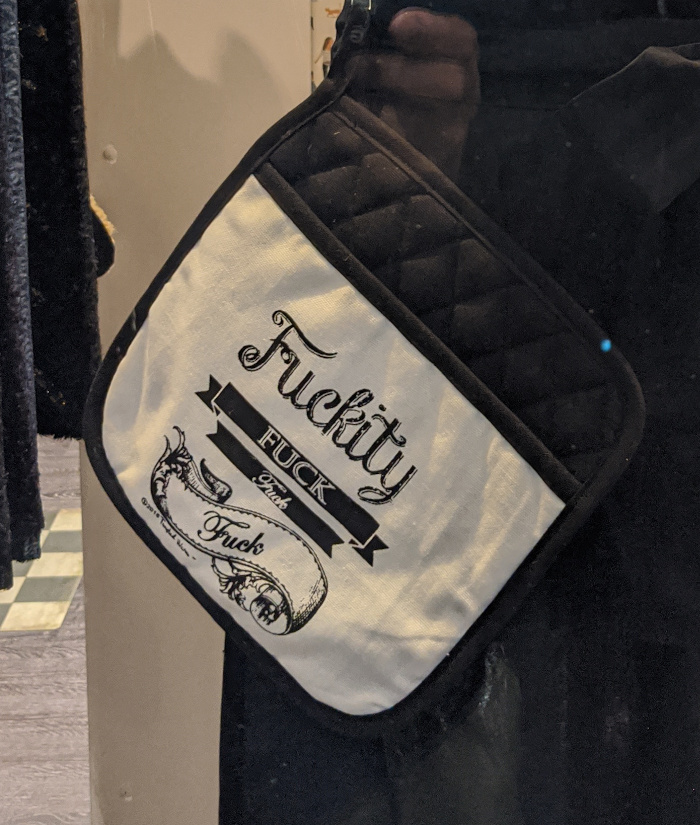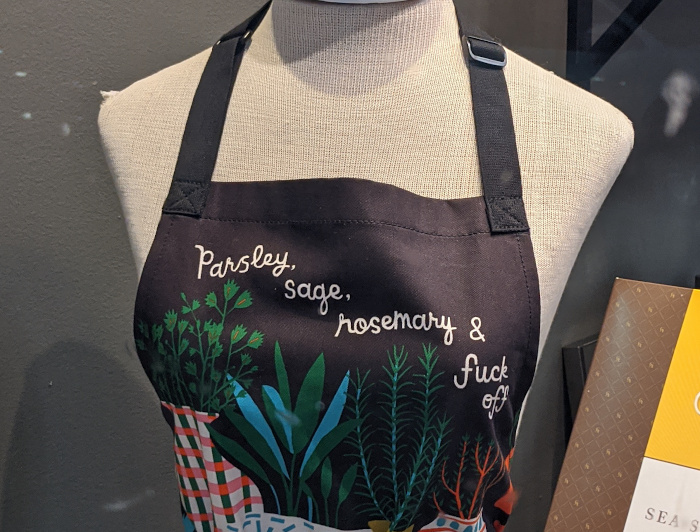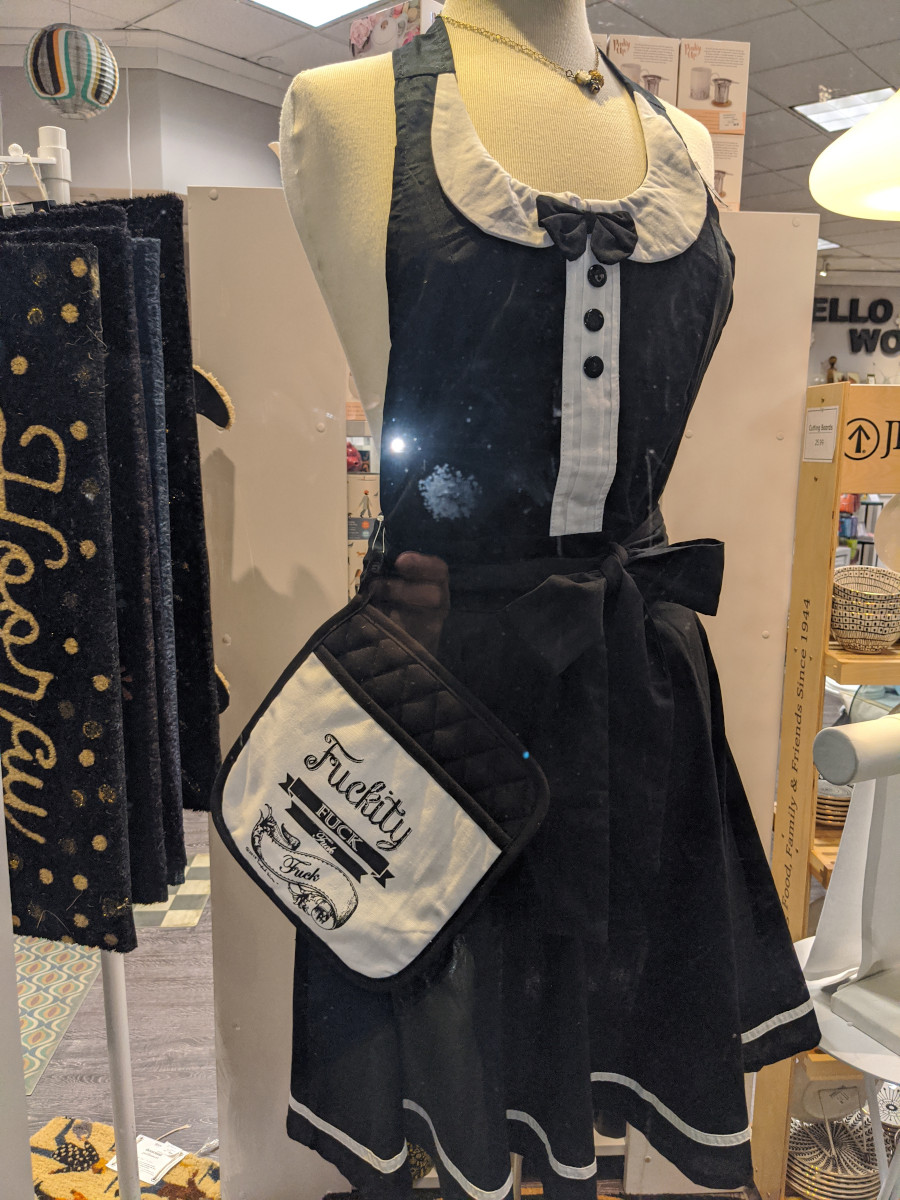Changing times
« previous post | next post »
Changing norms about public display of certain words, as exemplified in the display windows of a local store:
 |
 |
 |
A larger visual context for the last two:
 |
 |
February 29, 2020 @ 5:46 am · Filed by Mark Liberman under Taboo vocabulary
« previous post | next post »
Changing norms about public display of certain words, as exemplified in the display windows of a local store:
 |
 |
 |
A larger visual context for the last two:
 |
 |
February 29, 2020 @ 5:46 am · Filed by Mark Liberman under Taboo vocabulary
Powered By WordPress
AntC said,
February 29, 2020 @ 11:59 am
Seems less offensive than Melania's jacket "I really don't care Do you"
Martha said,
February 29, 2020 @ 1:48 pm
Last summer, my friend and I were in a store that had a bunch of oven mitts and socks and things with swear words, and they had placed tape over the swear words.
Kaleberg said,
February 29, 2020 @ 2:35 pm
I noticed the relaxing of the rule about certain words in shop windows about fifteen years ago. A shop on 14th Street in NYC near Union Square had a tasteful array of "I Fucked Your Boyfriend" tee shirts in various colors. Judging from the manikins, they were for ladies.
Trogluddite said,
February 29, 2020 @ 2:37 pm
The latter two examples are at least rather more likely to go unnoticed than the rebranding of UK clothing company French Connection using the trademarked initalism FCUK a decade or two ago; which produced precisely the kind of hullabaloo which their advertising agents intended.
I have to admit a bit of a titter at the rather more inventive punning of the furniture company who advertised their products as; "Sofa King good!"
Suzanne Valkemirer said,
February 29, 2020 @ 4:42 pm
“MYTH Nº 1 / Marketing / IS / BS / THAT’s BALONEY. / […]” (advertizement for Adobe Marketing, The New York Times. 24 October 2012. P. B20).
See https://en.wikipedia.org/wiki/Schitt%27s_Creek on the Canadian television sitcom Schitt's Creek (alluding to the idiom be up shit's creek, which, in turn, is a dysphemization of the idiom be up the creek).
Viseguy said,
February 29, 2020 @ 6:32 pm
I see language like this all the time on my window to the world — my phone — so why not in shop windows? The internet has had a vast desensitizing effect, I think. We're all authors, editors, directors and producers now, and we set our own standards. Even the Gray Lady has had to admit "grab them by the pussy" and "shithole countries" into her lexicon. The trend is refreshing on some levels, disconcerting on others.
Philip Taylor said,
February 29, 2020 @ 10:57 pm
Like Viseguy, I too "see language like this all the time on my window to the world" (in my case, my computer monitors rather than a telephone) but I do not experience any desensitising effect — the patently unnecessary use of (e.g.,) the 7-letter F-word as an intensifier in comments on (e.g.,) YouTube videos, newspaper articles, and so on, offends me no less today than it did in the past. Such language is almost always unnecessary (other than in moments of extreme stress), and I can see no way whatsoever in which society benefits from the increasing casual use and tolerance thereof.
AntC said,
February 29, 2020 @ 11:23 pm
@Philip Crikey!
Or have you not become desensitized to that blasphemy? Reading Chaucer or Shakespeare or Rabelais must have you blushing continually.
Philip Taylor said,
March 1, 2020 @ 1:56 am
Blasphemy is a related issue, I agree, but not my primary concern. And I don't blush when I read the F-word, or the C-word, or any of their ilk — the words are a part of my idiolect, and I use them in extremis, as do many people today. But I can see no benefit whatsoever in their casual use, and when I find them used in cases such as those I cited above (comments on videos, comments on newspaper articles, and so on), I really question the intelligence of the person submitting the comment and occasionally wonder what benefit they perceive in the casual use of such language..
Philip Taylor said,
March 1, 2020 @ 2:19 am
(and, let me be honest, I entertain very similar thoughts regarding intelligence and perceived benefit when I read "gonna" and its ilk).
But a serious question, if I may ? If it is now acceptable to use (for example) the F-word in online comments, and for it to be printed on articles of apparel, will there ever come a time when it is also accepted in academic papers (not those concerned with foul language, of course, but when it forms a "normal" part of the paper) ? If not, then where is the dividing line between places where such language is acceptable and accepted, and the places where it is, and always will be, regarded as totally unacceptable ?
Rose Eneri said,
March 1, 2020 @ 5:30 am
When words that are currently unacceptable in polite society become commonplace, I assume other words will take their place as swear words, thus forming something of a reverse euphemism treadmill.
In the future, when people stub their toe what will they shout? Are there any words in the pipeline toward becoming unacceptable, or will nothing be unacceptable?
Julian said,
March 1, 2020 @ 10:18 am
Browsing the airport bookstore recently, in the relationships/business/pop psychology/ men-are-from-mars-women-are-from-venus-you-too-can-succeed-like-Dale-Carnegie section, I found, within the space of a few metres, THREE books with 'fuck' in the title. One was 'The subtle art of not giving a fuck.' The others were – ah, forget it. The world of advertising and promotion is nothing if not a slave to fashion. I didn't buy.
Gregory Kusnick said,
March 1, 2020 @ 10:42 am
"and always will be"
People a thousand years hence may or may not have linguistic taboos of their own, but I find it hard to imagine that they're going to care very much about the particulars of ours, except as historical curiosities.
Indeed, it should be clear from the subject of this thread that a great many people alive today don't care very much about the taboos of social classes beyond their own.
Philip Taylor said,
March 1, 2020 @ 10:47 am
At 16 titles per page, Amazon UK reports 75 pages of books with the F-word in the title. Of course, that will include many duplicates, but I am now intrigued to know when the first such book was published.
Twill said,
March 1, 2020 @ 4:52 pm
There is something about this particular usage of expletives I find… twee? cloying? annoying as fuck?, whether censored (as in, as mentioned, every self-help book being entitled "f**k your life and f**k your friends" or something equally charming) or not (as in the given "fuckity fuck fuck fuck" example). I'm quite comfortable with salt-of-the-earth types where these nominally forbidden words are commonplace intensifiers, but in this case it recalls a child delighting in all the "four-letter words" simply because they are forbidden. Which I suppose just makes them attention-seeking in the tritest possible way.
John Swindle said,
March 1, 2020 @ 10:27 pm
In 2017 Annie Pfeifer wrote in a delightful piece in the New York Times that her 3-year-old daughter had learned to shock people with a new swear word, "Donald Trump!"
Alan said,
March 2, 2020 @ 1:20 am
@Phillip:
“I occasionally wonder what benefit they perceive in the casual use of such language..”
Reading your repeated comments across multiple threads, I often wonder what benefit you perceive in being continually offended by something so commonplace and mundane when there are so many truly unjust things in the world that are worthy of offence.
Or is it only okay for you to judge other people’s intelligence for their superficial language choices, but not the other way around?
Berwick said,
March 2, 2020 @ 3:11 am
I have to agree with everything Twill said. This "tee-hee, i'm using naughty words in non-traditional situations" attitude seems to be a hallmark of those in a resolute state of arrested development. The same crowd that talk of "adulting" with a straight face.
Francois Lang said,
March 2, 2020 @ 3:24 am
Here's a sort-of children's book that is relevant to this discussion
https://en.wikipedia.org/wiki/Go_the_Fuck_to_Sleep
https://www.amazon.com/Go-F-Sleep-Adam-Mansbach/dp/145584165X
Philip Taylor said,
March 2, 2020 @ 4:40 am
Alan — I perceive no benefit whatsoever in being continually offended by the casual use of obscene language, just as I perceive no benefit whatsoever in being continually bitten by mosquitoes. The fact that these things are not accompanied by any benefit makes no difference whatsoever to whether or not they take place. As to intelligence judgements, each is free to make his/her own, just as I do.
Trogluddite said,
March 2, 2020 @ 6:46 am
@Twill: I agree; I also perceive such "ironic" usage as rather childish very often. On the rare occasions that I do find it humorous, there is always other factors in play than mere usage of the words (I was going to say "out-of-context usage", but as the joke has now worn rather thin through repetition, this is hardly the case).
Regarding your comment about "commonplace intensifiers", and considering @Rose Eneri's comment about the erosion of the intensifying effect by their ubiquity: I wonder whether we might better say that their primary purpose is to mark sociolect or register rather than intensification in many cases. That is; that the pragmatic intent is not to convey strength of feeling, but rather; "I'm comfortable using this word in your presence because our in-group accepts it as inoffensive".
Gregory Kusnick said,
March 2, 2020 @ 3:15 pm
Philip, you say that taking offense at casual obscenity is not pleasant for you, nor something you have any control over. In that case, it seems to me, your ire should rightly be directed at the teachers who instilled this unpleasant aversion in you, and not at people who lack that particular aversion and speak naturally in their own idiolects, and whose behavior you cannot change.
Leo said,
March 2, 2020 @ 11:04 pm
Obscenities may be considered taboo in some contexts even by their most enthusiastic users. Swearing in front of children is – or used to be – widely disapproved of in British families, for example. Such words can be perceived by the hearer as akin to linguistic violence, and I suspect that many swearers understand that at some level. Swearing out of context might therefore be not just a lexical solecism but an act of aggression, and one doesn't necessarily have to be 'taught' to take offense at aggressive behaviour from strangers.
Philip Taylor said,
March 3, 2020 @ 12:28 am
No teacher (qua teacher) was involved, Gregory — I was taught by my parents (as were most [probably all] properly brought-up children of my generation and nationality) that obscene language had no place in civilised discourse. I believe that my parents were correct in seeking to inculcate this particular set of values in me, and that far from being angry with them I should be grateful to them for having done their best to raise me properly despite their poverty and their working-class backgrounds.
Leo's point is a good one — listen to Anthony Middleton's use of the F-word when berating his would-be SAS members : it is used as intensifier, but also quite clearly as a signal of aggression and authority.
Chandra said,
March 4, 2020 @ 10:50 am
I don't even swear that much myself, but it amuses me to no end how the ok-boomer contingent can work itself up into such a froth over a harmless string of letters or phonemes, and then turn around and accuse young people these days of being overly fragile.
Anyway, this generational gap in usage of swears reminds me a bit of when I realized, while doing an English teaching practicum in Ste-Foy, that the phrase "c'est fucké" in colloquial Québécois is almost completely inoffensive, akin to saying "it's messed up" in English. They have adopted the word itself but none of the taboo surrounding it, and my students were very surprised to learn that it would have gotten them sent to the principal's office back in Ontario.
Barbara Phillips Long said,
March 4, 2020 @ 3:48 pm
I thought I had instructed about and also modeled appropriate language for my children.In the 1990s they were in school in Kentucky and were offended when a teacher disciplined a student for swearing. I can’t remember if the student said something like “my god” or if I mentioned that some of their teachers who were conservative and Christian would consider it offensive and possibly blasphemous. My kids looked at me like I had grown three heads and said that “everybody” used “oh my god” and I was out of line to consider it unacceptable.
They thought terms related to sex and bodily functions were more unacceptable than words such as hell, damn, Jesus Christ and other religiously derived swear words. The absolute worst and most unacceptable words, according to them? Racist and ethnic slurs. They felt that slurs were grounds for sending their classmates to the principal’s office, but swearing in its various forms, was not.
The term “that sucks” was getting or had gotten popular during that time. Some parents just let it go by, while other parents thought about what it rhymed with and banned it.
In more recent years, watching HGTV remodeling reveals, it’s pretty evident that “oh my god” is indeed very common. The term is never censored that I’ve noticed.
Rodger C said,
March 6, 2020 @ 2:30 am
other parents thought about what it rhymed with
I always assumed that the objectionable part was the implied direct object.
David Marjanović said,
March 6, 2020 @ 4:05 pm
You're not kidding. They're saying it in China now (ōumǎgā), and after O Gott died out in German some 50 years ago (well, my most religious aunt still says it), it's now back as O mein Gott thanks to dubbing of TV series from Hollywood.